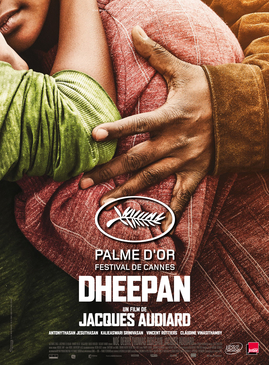
Wikimedia Commons
In an effort to raise awareness of the challenges facing refugees, the MacMillan Center Program on Refugees, Forced Displacement, and Humanitarian Responses hosted a screening of the French film “Dheepan” on Tuesday night.
About 20 students and community members gathered to watch the film, which tells the story of three Tamil refugees who flee the Sri Lankan Civil War and move to France to rebuild their lives.
“This film demonstrates very well the challenges of refugees arriving in France,” said Naysan Adlparvar, who introduced the movie and is the Rice Faculty Fellow at the MacMillan Center’s Council on Middle East Studies. “It highlights not only the challenges that refugees flee from, and the harrowing journeys they make to claim asylum, but also the hardships they face when trying to integrate in their new homes.”
The film follows a Sri Lankan man, woman and young girl who pose as a family in order to seek asylum in France after the Sri Lankan Civil War. The man, a former freedom fighter in the Tamil Tigers, uses the passport of a dead Sri Lankan named Dheepan, and the three refugees find themselves in another conflict zone when they move to a French housing project plagued by gang violence.
Earlier this month, the MacMillan Center showed the documentary “Fire at Sea” to illustrate the plight of refugees crossing the Mediterranean Sea to Europe. Adlparvar said he suggested “Dheepan” for the second screening because it depicts the struggle of integrating into a new country, a part of the refugee experience that often goes overlooked. In order to integrate, refugees must deal with a host of issues, such as learning a new language, overcoming trauma from their host countries and finding employment and education opportunities, he said. The film touches on all of these issues.
“Dheepan” was partly inspired by the 1971 film “Straw Dogs,” as well as by the experiences of Antonythasan Jesuthasan, the actor who stars as the title character. Like the film’s protagonist, Jesuthasan was a child soldier with the Tamil Tigers before he fled to France as a refugee in 1993.
Adlparvar added that film is an effective medium for conveying the struggle of refugees. In addition, he said, the movie has other elements — romance, action and tension — that just make it a “really good film.” At the 2015 Cannes Film Festival, “Dheepan” won the Palme d’Or, the highest prize awarded.
The film screening served primarily to educate people about the difficulties refugees trying to integrate into new societies face, according to Adlparvar. He said the Program on Refugees, Forced Displacement, and Humanitarian Responses — which launched last year — mostly focuses on academic research and policy recommendations, and the film screenings of “Fire at Sea” and “Dheepan” sought to expand the program’s outreach within the Yale community.
Prerna Bhat FES ’19 said the event caught her eye since the refugee crisis has been a prominent issue in the news recently. Bhat said the experiences of refugees are often told in terms of numbers and statistics. She added that she was interested in learning about integration issues through the lens of the personal experiences of refugees.
Elm City resident Tracy Peters said she found out about the screening through the New Haven chapter of Alliance Française, an organization that promotes French language and culture. She said she appreciated the film’s uplifting ending, when the refugees eventually assimilate into the country and enjoy a happy life together.
Though it may be impossible for most Americans to relate to refugees, Peters added, the film’s powerful portrayal of their experience can help viewers understand the hardships and challenges that refugees endure.
“Most of us cannot understand what it’s like for somebody who has to leave their country under such circumstances,” she said. “So many of us may donate items, but we don’t have much interaction to really get to know them and understand what they’re going through.”
Before the screening began, Adlparvar said he hoped that the film would empower attendees to reach out to support refugees here in New Haven. Members of the Yale and New Haven community members can get involved by volunteering at Integrated Refugee and Immigrant Services in New Haven or by serving as a liaison to a refugee family, he said.
“Little things like that have a big impact on the way the refugees feel when they come to a new place,” Adlparvar said.
“Dheepan” was the first French film shot almost entirely in the Tamil language.
Alice Park | alice.park@yale.edu







